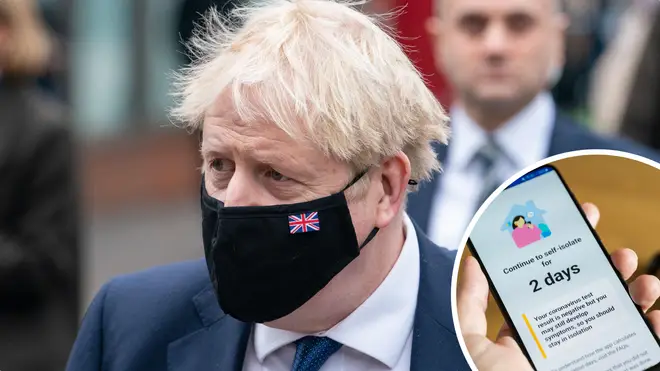
James O'Brien 10am - 1pm
10 January 2022, 12:59 | Updated: 7 June 2023, 08:56

Prime Minister Boris Johnson has confirmed ministers are considering reducing the self-isolation period for fully-vaccinated people who test positive for coronavirus.
The self isolation could be reduced from seven days to five days, Mr Johnson said during a visit to a vaccination clinic in Uxbridge, but he stressed the Government was still following the science.
"There's a similar argument to be had about the quarantine period - whether to come down from seven days to five days," he told broadcasters.
"The thing to do is to look at the science.
"We are looking at that and we will act according to the science."
Read more: 96% of pregnant women in hospital with Covid are unvaccinated, figures show
Read more: Calls for PM to be personally questioned by inquiry into No10 parties
Following Mr Johnson's remarks, Downing Street said "if it is possible to go further, then we will do so" in reducing the quarantine time.
"You'll appreciate Omicron being a relatively new variant, we get more information fairly regularly so you can expect certainly UKHSA (UK Health Security Agency) to lead that work, working with the Covid taskforce which is based in the Cabinet Office, will continue to look at the evidence for what is the right period of isolation," said the Prime Minister's official spokesperson.
"Of course as the Prime Minister said, if it is possible to go further, then we will do so."
And he added: "We'd want to act quickly but it needs to be based on the latest evidence and that work is still ongoing.
"We certainly haven't received any further updated advice."

Boris Johnson responds to Novak Djokovic
Mr Johnson also attempted to alleviate concerns about free lateral flow tests being scrapped, saying the Government would continue to make them available "for as long as necessary".
"We are going to have to make sure we continue to use testing as one of our most important lines of defence for as long as is necessary," he said, and added getting vaccinated was another important weapon.
"The other line of defence in addition to testing is of course getting vaccinated," he said.
"The boosters are going well.
"We have now done 36 million boosters - 90 per cent of people over 50 - but clearly there is an opportunity for people who have not been boosted."
He urged people who had not got their boosters to "join the movement".
Read more: Tory MP warns of massive revolt if Boris Johnson doesn't ditch Covid restrictions
Read more: Lateral flow tests will remain free for now, minister insists
Boris Johnson has been under increasing pressure to tone down Covid rules as more data emerges suggesting Omicron is milder than Delta.
On Sunday, the Prime Minister was warned he faces a huge revolt from his own MPs if he does not end all restrictions later this month, which include a mask mandate and guidance to work from home.
Mark Harper, chair of the lockdown-sceptic Covid Recovery Group, also said the Prime Minister could even face a leadership challenge if the Tories do badly in May's local elections.
Recent polling has shown Mr Johnson's popularity has rapidly diminished, and Mr Harper is not the first to float the idea of a change in leadership.

Mass-vaccination against Covid should stop after the booster campaign
It come after a study from Imperial College London suggested infection from common colds could offer people some degree of protection against Covid-19.
A study's found people with high levels of T cells - which are created by the body when they're ill with other coronaviruses - are less likely to become infected.
Professor Ajit Lalvani, one of the researchers, said the finding that T-cell immunity could be "cross-protective" was "striking".
"If you have the T-cells, you didn't seem to get infected," he said of participants in the study.
However researchers warned "no one should rely on this alone" and said people should still get vaccinated as the "best way" to be protected against the virus.